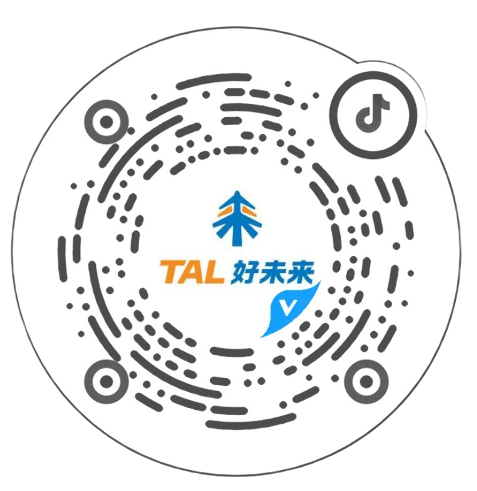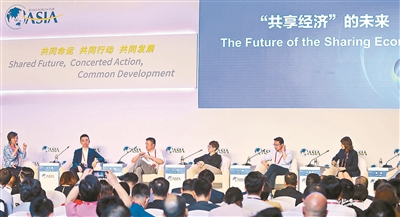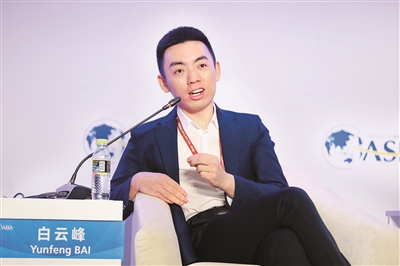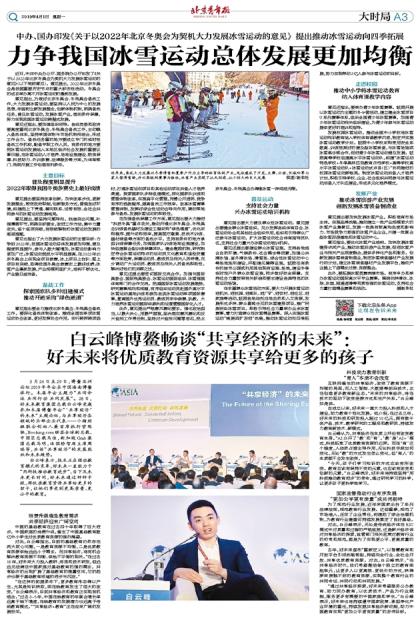






From March 26th to 29th, the 2019 Boao Forum for Asia Annual Conference was held in Boao, Hainan, China. The theme of this year's annual conference was "Shared Future, Concerted Action, Common Development." On the 28th, Bai Yunfeng, President of Good Future Education Group, was invited to participate in the "The Future of the 'Sharing Economy" forum at this year's Boao Forum, along with representatives from leading companies in the sharing economy such as Chen Chi, Co-founder and CEO of Xiaozhu Short Term Rental, Ma Jia, Vice President of Booking.com and President of Booking.com China, Ma Ming, President of Grab Group, and Zhou Rui, Chairman of the French Bridge Think Tank, to discuss the current development and future trends of the sharing economy.
Bai Yunfeng stated that technology is driving the transformation of education models, and Good Future has been committed to "advancing education with technology," aiming to share high-quality educational resources with more children through various means now and in the future, enabling them to enjoy higher quality and more equitable education.
Consumer Upgrading Drives Education Demand
The Sharing Economy Sees Vast Potential
China's basic education has made tremendous progress over the past forty years. Consumer upgrading in Chinese households has created a strong demand for high-quality educational resources for hundreds of millions of elementary and middle school students in China. Bai Yunfeng pointed out that there are still two major core problems in current basic education in China: unequal distribution of educational resources and a supply of high-quality educational resources far lower than the demand. The sharing economy has the opportunity to address the current situation of unequal and inadequate educational resources. "Over the past 16 years, Good Future has invested heavily in educational research, teaching staff, and technological research and development, but it is far from satisfying the strong demand of Chinese families for basic education. The emergence of the sharing economy has expanded the increment of basic education, which has also originated from progress and sedimentation in the field of basic education."
"Under these circumstances, more educational forms have emerged, especially in knowledge acquisition, as online education has undergone significant changes," said Bai Yunfeng. Currently, the combination of the sharing economy and education is witnessing a vast development space. "Over the past 3-5 years, the compound annual growth rate of online education in China has far exceeded offline growth, and the potential for the development of online education is far greater than that of traditional education models." "The 'sharing economy + education' model is entering a vast development space."
Technology Assists Educational Innovation
The Essence of "Nurturing People" Will Not Change
The sharing economy born of the internet has changed the unequal distribution of educational resources, while cutting-edge technologies such as artificial intelligence and big data are creating more new educational formats. "The future sharing economy, driven by technology, will change the way connections and production relationships work," said Bai Yunfeng.
Since its inception, Good Future has been investing heavily in science and technology and talent development to promote personalized education. He explained that over the past three years, Good Future has invested more than 1 billion yuan in technology and research and development, and has thousands of engineers and researchers in various fields, continuously focusing on new educational technologies and models.
Bai Yunfeng believes that the sharing economy has not fundamentally changed education itself. "AI has separated 'teaching' and 'nurturing.' 'Teaching' follows the 'AI+' model, and technology has expanded the boundaries of high-quality educational resources. In the 'nurturing' dimension, humans still play a leading role. No matter how technology changes, the essence of 'nurturing people' will not change."
"More Equitable and Higher Quality" is a Common Expectation
In recent years, the Chinese government has enacted a series of laws and regulations to regulate the development of the education industry, standardizing market access, strengthening corporate responsibility, and establishing a comprehensive governance mechanism, thus laying a solid foundation for the healthy and sustainable development of the education industry.
In response to this, Bai Yunfeng expressed that whether it is the strict monitoring of quality and processes in the B2C model by traditional economies, or the exploration of the sharing economy by emerging economies, the relevant policies of the regulatory authorities on the education industry are aimed at achieving a more equitable and higher quality education. Last year, Good Future announced a "re-definition," leading strategic transformation with smart education and an open platform while continuously opening up and sharing high-quality educational resources to the entire industry and society. In the era of the sharing economy, we hope to activate each independent education unit and enable more people to access educational resources that were previously out of reach in a more efficient and cost-effective manner, thereby realizing the shared destiny, concerted action, and common development of the entire education industry," Bai Yunfeng said.
